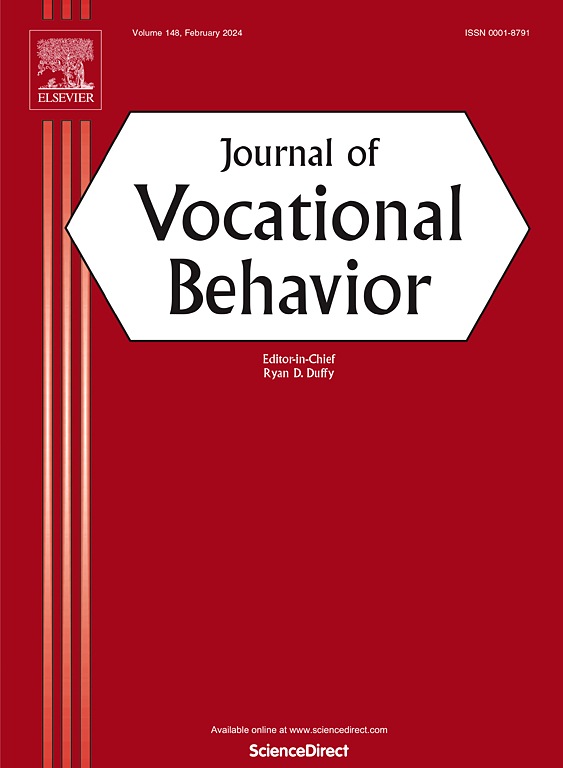Forgone identity dwelling and career exploration: A self-regulatory perspective
IF 5.2
1区 心理学
Q1 PSYCHOLOGY, APPLIED
引用次数: 0
Abstract
This research aims to explain whether and how dwelling on the past decision to forgo a certain academic major and corresponding professional identity (i.e., forgone identity dwelling) affects young adults' career exploration during the school-to-work transition. We draw on a self-regulatory perspective to theorize that forgone identity dwelling may result in a cognitive self-regulatory pathway (i.e., career insight) and an affective self-regulatory pathway (i.e., occupational regret) that affect career exploration in opposite directions. We further propose that young adults' affective disposition (i.e., positive affectivity) may act as a differentiating factor that determines whether forgone identity dwelling triggers a cognitive or affective self-regulatory process. In a three-wave survey study with a sample of Chinese university students, we found that for young adults high in positive affectivity, forgone identity dwelling was more likely to lead to cognitive self-regulation that increased career insight, which further positively affected career exploration. Conversely, for those low in positive affectivity, forgone identity dwelling was more likely to induce occupational regret. Theoretical and practical implications are discussed.
放弃身份居住与职业探索:一个自我调节的视角
本研究旨在解释在学校-工作过渡阶段,对过去放弃某一专业和相应职业认同的决定(即放弃身份认同)是否以及如何影响年轻人的职业探索。我们从自我调节的角度出发,认为放弃身份认同可能会导致认知自我调节途径(即职业洞察力)和情感自我调节途径(即职业后悔)在相反的方向上影响职业探索。我们进一步提出,年轻人的情感倾向(即积极情感)可能是决定放弃身份居住是否触发认知或情感自我调节过程的区分因素。通过对中国大学生的三波调查研究,我们发现,对于积极情感高的年轻人来说,放弃身份居住更容易导致认知自我调节,从而增加职业洞察力,进而对职业探索产生积极影响。相反,对于那些积极情感较低的人来说,放弃身份认同更容易引起职业后悔。讨论了理论和实践意义。
本文章由计算机程序翻译,如有差异,请以英文原文为准。
求助全文
约1分钟内获得全文
求助全文
来源期刊

Journal of Vocational Behavior
PSYCHOLOGY, APPLIED-
CiteScore
13.10
自引率
5.40%
发文量
85
期刊介绍:
The Journal of Vocational Behavior publishes original empirical and theoretical articles offering unique insights into the realms of career choice, career development, and work adjustment across the lifespan. These contributions are not only valuable for academic exploration but also find applications in counseling and career development programs across diverse sectors such as colleges, universities, business, industry, government, and the military.
The primary focus of the journal centers on individual decision-making regarding work and careers, prioritizing investigations into personal career choices rather than organizational or employer-level variables. Example topics encompass a broad range, from initial career choices (e.g., choice of major, initial work or organization selection, organizational attraction) to the development of a career, work transitions, work-family management, and attitudes within the workplace (such as work commitment, multiple role management, and turnover).
 求助内容:
求助内容: 应助结果提醒方式:
应助结果提醒方式:


